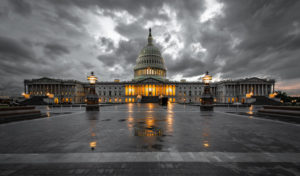
The SEC requires companies to report emissions and climate risks, the VA expands reproductive health services, and more…
IN THE NEWS
- The U.S. Securities and Exchange Commission (SEC) approved a final rule requiring certain public companies to report their greenhouse gas emissions and climate risks. Under the new rule, large companies must disclose only direct emissions they deem “material” to their financial standings, with exemptions granted to thousands of smaller businesses. The SEC’s initial proposal would have mandated disclosure across industries regardless of size. SEC Chair Gary Gensler stated that the rule aims to improve “consistency” and “comparability” of disclosures to meet rising investor demand for climate-related information.
- The U.S. Supreme Court reversed the Colorado Supreme Court’s ruling that President Donald J. Trump is ineligible to run for office under Section 3 of the 14th Amendment. Section 3 prohibits those who previously held government positions but later “engaged in insurrection” from running for office. The Court did not discuss whether the former president had engaged in an insurrection but, instead, focused on who has the power to enforce Section 3 against those seeking federal office. The Court held that states, such as Colorado, do not have the power to enforce this provision because the Constitution gives Congress that authority.
- The Department of Veterans Affairs issued a final rule changing the reproductive health services the agency includes in its medical benefits package. The rule expands veterans’ access to abortion counseling and provides access to abortion when a health care professional determines that the life or health of the pregnant veteran is in danger or the pregnancy is the result of rape or incest. The agency explained that the ruling in Dobbs v. Jackson Women’s Health Organization does not affect its statutory authority to develop regulations related to the medical care of veterans.
- The U.S. Food and Drug Administration (FDA) approved eye drops developed by Eyenovia to reduce inflammation and pain in patients post-cataract eye surgery. The drops contain a steroid typically used for skin conditions, such as eczema, but were typically not used for eye diseases. The newly approved drops join other FDA-approved drops that treat inflammation post-eye surgery. Eyenovia plans to launch their product later this year.
- The U.S. Food and Drug Administration (FDA) announced that it would allow yogurt makers to make qualified claims that consuming yogurt may reduce the risk of type 2 diabetes. FDA allows companies to make qualified health claims when scientific evidence supports the relationship, but, to make an authorized health claim, FDA requires “significant scientific agreement.” After receiving a petition for review, FDA found credible, albeit limited, evidence supporting an association between yogurt consumption and lowered risk for type 2 diabetes.
- The U.S. Environmental Protection Agency announced a final rule designed to prevent accidents at hazardous chemical facilities. The new rule requires these facilities to establish procedures for disasters, such as storms and floods, and to operate with greater transparency with nearby communities and emergency responders. The rule also requires sites that previously had an accident to undergo an independent audit. The American Chemistry Council claimed that the rule will place significant burdens on chemical producers without any significant reduction in accidental releases of hazardous materials.
- The Consumer Financial Protection Bureau (CFPB) issued a final rule designed to reduce credit card late fees. The rule mandates that credit card companies can only charge late fees equal to costs credit card issuers incur from the late payments so the issuers cannot make a profit off late fees. The CFPB expects the rule to cut the average late fee from $32 to $8—saving American families more than $10 billion in annual late fees. The rule, however, does not prevent credit card issuers from raising interest rates or adopting other measures to deter late payments.
- The Centers for Disease Control and Prevention (CDC) updated its guidelines for Americans who test positive for COVID-19 by eliminating the five-day isolation requirement for work and school. CDC cited new data showing reduced likelihood of severity, with fewer hospitalizations or deaths per infection. The new guidance encourages individuals to remain at home until they have been fever-free without medication for 24 hours, and until their symptoms have shown improvement for the last 24 hours when sick before resuming normal activities.
WHAT WE’RE READING THIS WEEK
- In an article for the Brookings Institution, Nathan Donley, an environmental health science director at the Center for Biological Diversity, and Robert Bullard, a professor at Texas Southern University, explained how pesticide exposure is disproportionately impacting communities of color and low-income communities in the United States. Donley and Bullard argued that the U.S. Environmental Protection Agency (EPA) has failed to enforce pesticide mitigation laws, which has caused some U.S. farmers, 83 percent of whom are Hispanic, to have 400 times greater levels of pesticides in blood and urine samples than the national average. Donley and Bullard proposed that EPA reassess the “reliable” data it uses in approving pesticides, since the pesticide industry has funded the studies that provide much of this data.
- In a recent published paper, Cary Coglianese, a professor at the University of Pennsylvania Carey Law School, showed how the way that regulators design rules ultimately affects the relationship between regulators and regulated entities–and how that relationship can also factor into how rules ought to be designed. Coglianese proposed a framework that considers both a means-end dimension and a micro-macro dimension of any rule. The means-end dimension centers on whether a rule focuses on the actions regulated entities must take or avoid, versus the outcomes to be achieved or avoided. The macro-micro dimension captures whether a rule and its obligations are focused on a contributor to a regulatory problem or on the problem itself. Coglianese argues that understanding and applying this framework, as well as seeing how it can both affect and be affected by a regulator’s relationship with regulated entities, can enable regulators to do a better job in selecting the appropriate regulatory design to address specific problems.
- In an article in Frontiers, Juan Dempere, Kennedy Prince Modugu, and Lakshmana Ramasamy, professors at Higher Colleges of Technology, and Allam Hesham, a professor at Ball State University, argued that balanced regulation for publicly available artificial intelligence (AI) is necessary to detect and mitigate risks of academic fraud. The authors highlighted the benefits of AI platforms in education, including supporting research and improving automated grading. The study, however, also noted concerns over testing security, such as misinformation, plagiarism, and job displacement. Dempere and his co-authors underscored the need for responsible and ethical integration of AI within educational settings.
EDITOR’S CHOICE
- In an essay in The Regulatory Review, Richard J. Pierce, a professor at The George Washington University Law School, argued that gasoline must be substituted for electricity as the primary transportation fuel and carbon-free fuels must be used over fossil fuels as the country’s primary source of electricity to effectively mitigate climate change. Pierce argued that these changes depend on voters voting in favor of constructing transmission lines that support these types of energy. Pierce observed, however, that voters often ignore the national interest in favor of their individual interests. But, without voters’ support, Pierce warned, the United States will fail to make the necessary changes to effectively mitigate climate change.



